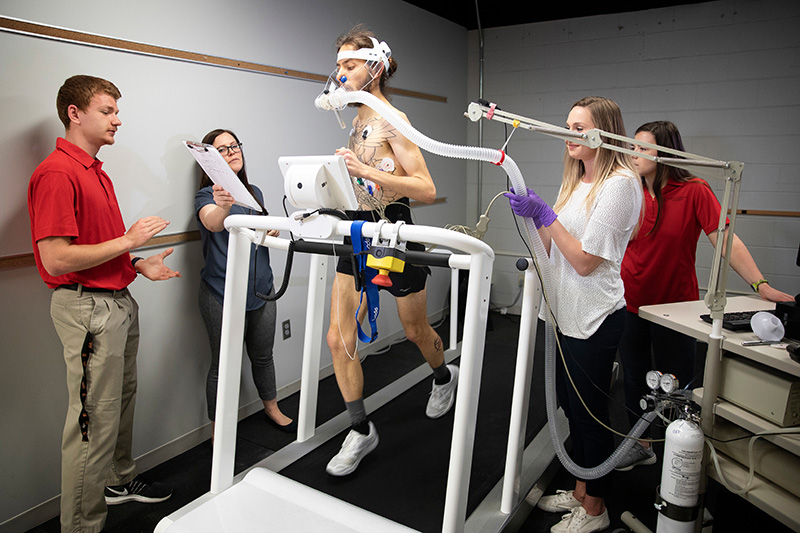Inside the Exercise Physiology Lab
- published: 2019/06/18
- contact: College of Education
- email: unocoe@unomaha.edu
This spring, two College of Education researchers—a faculty member and a then-doctoral student—won prestigious awards at Convocation for excellence in their field. Their connection? They were mentor and mentee in the School of Health and Kinesiology's Exercise Physiology Lab.
Treadmills, exercise bikes, and a weight machine line the walls. At first glance, the Exercise Physiology Lab could be mistaken for a small fitness center. But this is no average room. This is one of the most innovative research facilities of its type in the U.S., and it's supervised by Associate Professor Dr. Dusty Slivka, winner of the 2019 Outstanding Graduate Mentor Award.
Dr. Slivka's research and expertise are what inspired Roksana Zak, Oncology Clinical Research Specialist for the University of Nebraska Medical Center and Dr. Slivka's nominator, to enter UNO's Ph.D. in Exercise Science program in 2015. Zak describes Dr. Slivka as "an exceptional mentor to many students in the program, including myself."
"I admire his ability to develop a fascinating research agenda, and his grantsmanship skills are impressive. His students get exposure to not only research but to teaching and seeking funding as well."
The effects of extreme climates on endurance and performance
Funded primarily by the Department of Defense, Dr. Slivka's research is used to help soldiers in the field with a focus on improving athletic and muscular endurance and performance in extreme climates.
Specific weather conditions can be created in the lab's Environmental Chamber, a specially-designed room with controls for temperature, humidity, and altitude. Tests performed in the chamber tell researchers how exercising in extreme environments can affect cells—and offer clues to unlocking the causes of aging or origin of diseases such as diabetes and periphery artery disease.
"The pathology of many diseases has an origin in the function of mitochondria. We study the effects of exercise in certain environmental conditions on a cellular level and how that impacts health, disease, and performance," explains Dr. Slivka.
The use of human biological samples is what makes the research so innovative. Muscle biopsies are taken before and after testing and stored in the lab's freezers. These tiny samples are meticulously prepared over several days using cutting-edge molecular techniques and then analyzed to provide data about how the muscles respond to the testing conditions.

Preparing students for research careers
Students work hand-in-hand with Dr. Slivka during the entire process. "The highlight of our lab is our students—how smart they are, how hard they work. It is especially fulfilling to watch their confidence grow. They come in timid, a little unsure of themselves, and their confidence grows tremendously as they work with clients or perform more duties in the lab. It's great to see a student begin to find the answers to their own questions, to realize, 'Hey! I can figure this out!'"
New alumnus and former graduate assistant (GA) Dr. Robert "R.J." Shute received the 2019 Helen Hansen Outstanding Graduate Student Award this April. He attributes the award to his GA experience in Dr. Slivka's lab.
"Winning this award validated the countless hours I spent working on research and classes. My work as a GA had a large contribution to winning this award. I would not have had the opportunity to assist in many of the research projects, presentations, and teaching experiences had I not been a GA," says Dr. Shute, who is headed to the University of Virginia for a postdoctoral fellowship in the fall.
Recent graduate Megan Vande Hei plans to pursue a Ph.D. in Physiology at the Medical College of Wisconsin this fall and is well-prepared for the next step of her academic journey.
"Working in the lab provided a comprehensive immersion of research, teaching, and community fitness engagement. These hands-on opportunities supplemented my coursework and better prepared me to think critically, collect and organize data, utilize molecular techniques, and convey scientific information to a larger audience."
Vande Hei continues, "Dr. Slivka encouraged us to take an active role in everything happening in the lab, which really fostered our learning. He gave us enough independence to think freely and troubleshoot when necessary but was also there to support us when assistance was needed."

Connecting with the community
Exercise Science students also gain hands-on experience by running fitness testing offered to the public for a small fee. Some of the more popular tests measure aerobic capacity or body composition—like Underwater (or Hydrostatic) Weighing, the current gold standard of measuring body fat.
I learned more by working in the lab than from any textbook I have ever read."
New alumna and former graduate assistant (GA) Katherine Marshall coordinated the Adult Fitness Program during her time at UNO, which provided her an opportunity to practice professional skills and offer one-on-one help to clients.
The Adult Fitness Program is a group class for adults who want to maintain quality of life and independent lifestyle but struggle with physical challenges like obesity, mobility changes, advanced age, or rehab situations. Clients meet at the lab twice a week for a specialized exercise program, working on goals related to daily living like balance, stability, and lifting.
As she hands over the reins to the new GA coordinators, Marshall reflects on her work, "The most beneficial part of working in the Exercise Physiology Lab was furthering the depth of knowledge I had gained in the classroom by applying it in a hands-on setting. I think I learned more by working in the lab than from any textbook I have ever read."



